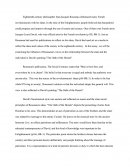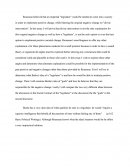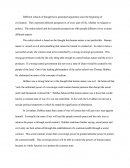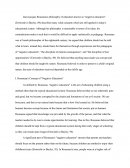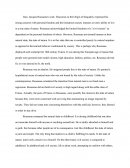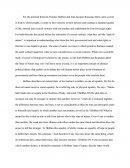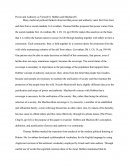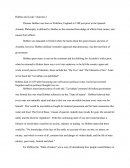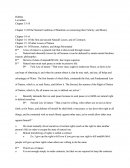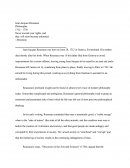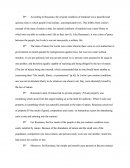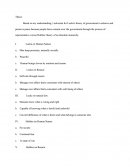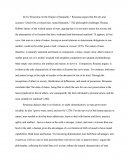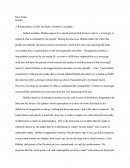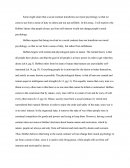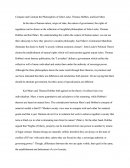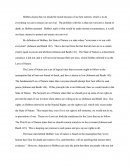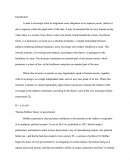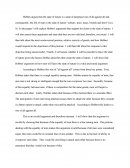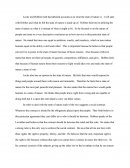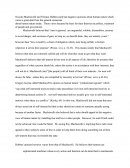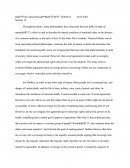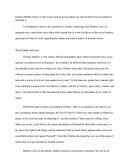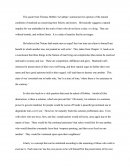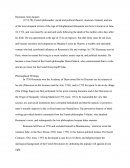Hobbes Rousseau essays and research papers
Last update: May 22, 2015-
The Influence of Rousseau's Views on the Relationship Between the State and the Individual in David's Painting "the Oath of the Horatii"
Eighteenth-century philosopher Jean-Jacques Rousseau influenced many French revolutionaries with his ideas. In the time of the Enlightenment, people believed that humankind could progress and improve through the use of reason and science. One of them was French artist Jacques-Louis David, who was official artist to the French revolution (p158, Blk 3). Just as Rousseau had used his publications to reflect on his ideas, David had used art as a media to reflect the ideas and
Rating:Essay Length: 1,244 Words / 5 PagesSubmitted: November 9, 2010 -
Rousseau
Rousseau believed that an impartial "legislator" would be needed to come into a society in order to implement positive change, while blaming the original negative change on "divine intervention". In this essay I will prove that divine intervention is not the only explanation for this original negative change as well as how a "legislator", is not the only option or even the best option to implement positive societal change. Rousseau's unwillingness to offer any other
Rating:Essay Length: 280 Words / 2 PagesSubmitted: November 9, 2010 -
Views of Hobbes and Nietzche
Different schools of thought have generated arguments since the beginning of civilization. They represent different perspectives of every part of life, whether its religion or politics. The realist school and the humanist perspectives offer people different views in many different aspects. The realist school is based on the thought that human nature is not perfectible. Human nature is viewed as evil and something that cannot be trusted or counted on. In order to have a
Rating:Essay Length: 761 Words / 4 PagesSubmitted: November 17, 2010 -
Jean Jacques Rousseau Critique
Jean-Jacques Rousseau's philosophy of education known as "negative education" (Entwistle in Bayley, 89) describes many valid concepts which are still applied in today's educational system. Although his philosophy is reasonable in terms of its ideas, his contradictions make it such that it would be difficult to apply realistically as pedagogy. Rousseau was a French philosopher of the eighteenth century, he argued that children should not be told what to learn, instead they should learn for
Rating:Essay Length: 1,324 Words / 6 PagesSubmitted: November 17, 2010 -
Jean - Jacques Rousseau
Jean- Jacques Rousseau's work, Discourse on the Origin of Inequality expressed his strong concerns with personal freedom and the limitations society imposes on one's ability to live in a true state of nature. Rousseau acknowledged the limited freedoms of a "civil society" as dependent on the personal freedoms of others. However, Rousseau envisioned humans in their natural state, the state of nature. It is in this state that one is controlled purely by natural impulses
Rating:Essay Length: 2,543 Words / 11 PagesSubmitted: November 19, 2010 -
Hobbes and Locke
For the political theorists Thomas Hobbes and Jean-Jacques Rousseau there came a point in history where people, in order to have security in their persons and maintain a standard quality of life, entered into a social contract with one another and established the first sovereign states. For both theorists the period before the institution of a social contract, what they call the "state of nature", is important in understanding what form this first government took
Rating:Essay Length: 2,652 Words / 11 PagesSubmitted: November 19, 2010 -
Power and Authority as Viewed by Hobbes and Machiavelli
Power and Authority as Viewed by Hobbes and Machiavelli Many medieval political thinkers observed that power and authority came first from God and then from a social mandate. In Leviathan, Thomas Hobbes proposes that power comes from the social mandate first. (Leviathan, Bk. I, Ch. 18, pp.230) He makes this assertion on the basis that it is within the human nature to secure its life through banding together with others to form a community. Each
Rating:Essay Length: 1,926 Words / 8 PagesSubmitted: November 21, 2010 -
Hobbes and Locke Outcome 2
Hobbes and Locke Outcome 2 . Thomas Hobbes was born in Wiltshire, England in 1588 just prior to the Spanish Armada. Philosophy is defined by Hobbes as the reasoned knowledge of effects from causes, and causes from effects. Hobbes was educated in Oxford where he learnt about the great classics and also of Aristotle, however Hobbes disliked Aristotle's approach that democracy was the best form of government. Hobbes spent many a year on the continent
Rating:Essay Length: 1,775 Words / 8 PagesSubmitted: November 23, 2010 -
Hobbes
Hobbes Leviathan Chapter 13-18 Chapter 13 Of the Natural Condition of Mankind, as concerning their Felicity, and Misery Chapter 14-16 Chapter 14: Of the first and second Naturall Lawes, and of Contracts Chapter 15: Of other Lawes of Nature Chapter 16: Of Persons, Authors, and things Personated Ð'* A law of nature is a general rule that is discovered through reason. o Natural and inherently known by all because it can be deduced by innate
Rating:Essay Length: 624 Words / 3 PagesSubmitted: November 25, 2010 -
Jean - Jacques Rousseau
Jean-Jacques Rousseau Philosopher 1712 - 1778 Never exceed your rights, and they will soon become unlimited. --Rousseau ________________________________________ Jean-Jacques Rousseau was born on June 28, 1712 in Geneva, Switzerland. His mother died shortly after his birth. When Rousseau was 10 his father fled from Geneva to avoid imprisonment for a minor offense, leaving young Jean-Jacques to be raised by an aunt and uncle. Rousseau left Geneva at 16, wandering from place to place, finally
Rating:Essay Length: 635 Words / 3 PagesSubmitted: November 25, 2010 -
Locke Vs. Rousseau
Ð'* According to Rousseau, the original condition of mankind was a peaceful and quixotic time in which people lived solitary, uncomplicated lives. This differs from Locke's concept of the state of nature in that, his natural condition of mankind was a state liberty in which one was able to conduct one's life as they saw fit. Like Rousseau's, it was a time of peace between the people, but Locke's was not necessarily a solitary life.
Rating:Essay Length: 382 Words / 2 PagesSubmitted: November 27, 2010 -
Locke and Hobbes
Thesis: Based on my understanding, I advocate for Locke's theory of government to achieve and preserve peace because people have consent over the government through the process of representative versus Hobbes' theory of an absolute monarchy. I. Locke on Human Nature a. Men keep promises, naturally socially b. Peaceful c. Human beings driven by emotion and reason II. Locke on Reason a. Self-rule through reason b. Manage own affairs that's consistent with interest of others.
Rating:Essay Length: 503 Words / 3 PagesSubmitted: November 30, 2010 -
Rousseau Vs. Marx
In his "Discourse on the Origins of Inequality," Rousseau argues that the arts and sciences "which first civilized men, ruined humanity." The philosopher challenges Thomas Hobbes' theory of the wicked nature of man, arguing that it is not man's nature but society and the pleasantries of civilization that have weakened and demonized mankind: "It appears, at first view, that men in a state of nature, having no moral relations or determinate obligations to one another,
Rating:Essay Length: 2,276 Words / 10 PagesSubmitted: November 30, 2010 -
A Reconciliation of Self and State in Hobbes' Leviathan
Ross Strain Kinlaw A Reconciliation of Self and State in Hobbes' Leviathan In the Leviathan, Hobbes argues for a social contract that involves rule by a sovereign, or monarch, that is instituted by the people. During his discourse Hobbes makes the claim that people are naturally inclined to pursue self interest, while at the same time positing that these very people have a responsibility to the sovereign that rules them. The apparent problem is immediately
Rating:Essay Length: 1,666 Words / 7 PagesSubmitted: December 3, 2010 -
Hobbes on Moral Duties
Some might claim that a social contract transforms our moral psychology so that we come to act from a sense of duty to others and not just selfishly. In this essay, I will express why Hobbes' theory that people always act from self-interest would not change people's moral psychology. Hobbes argues that being involved in a social contract does not transform our moral psychology, so that we act from a sense of duty, but rather
Rating:Essay Length: 757 Words / 4 PagesSubmitted: December 4, 2010 -
Compare and Contrast the Philosophies of John Locke, Thomas Hobbes, and Karl Marx
Compare and Contrast the Philosophies of John Locke, Thomas Hobbes, and Karl Marx In the idea of human nature; origin of state, the nature of government, the rights of regulation can be drawn as the reflection of insightful philosophies of John Locke, Thomas Hobbes and Karl Marx. By understanding this within the context of human nature, we can see their ideas play to how they perceive a modern philosophy. Karl Marx's Communist Manifesto illustrates the
Rating:Essay Length: 778 Words / 4 PagesSubmitted: December 5, 2010 -
Hobbe's Law of Nature
Hobbes claims that we should be moral because of our best interest, which is to do everything we can to ensure our survival. The problem with this is that not everyone is feared of death, as Hobbes assumed. Hobbes' reply to that would be under normal circumstances, it is still our basic instinct to protect and ensure our survival. By definition of Hobbes, the State of Nature is a state where "everyman is in war
Rating:Essay Length: 581 Words / 3 PagesSubmitted: December 8, 2010 -
Hobbes and Absolute Sovereignty
Introduction A state is sovereign when its magistrate owes allegiance to no superior power, and he or she is supreme within the legal order of the state. It may be assumed that in every human society where there is a system of law there is also to be found, latent beneath the variety of political forms, in a democracy as much as in a absolute monarchy, a simple relationship between subjects rendering habitual obedience, and
Rating:Essay Length: 3,508 Words / 15 PagesSubmitted: December 11, 2010 -
Hobbes' Political Philosophy
Hobbes argues that the state of nature is a state of perpetual war of all against all and consequently, the life of man in the state of nature "solitary, poor, nasty, brutish and short" (xiii, 9). In this paper I will explain Hobbes' arguments that support his claim to the state of nature. I will also assess these arguments and state that they are not valid and, therefore, not sound. I will then talk about
Rating:Essay Length: 1,095 Words / 5 PagesSubmitted: December 16, 2010 -
John Locke V Thomas Hobbes
Locke and Hobbes both had detailed accounts as to what the state of nature is. I will start with Hobbes and what he felt the state of nature is made up of. Hobbes believed in defining the state of nature as what it is instead of what it ought to be. So he focused in on the nature of people and came to a very descriptive conclusion as to how survive in this particular state
Rating:Essay Length: 1,775 Words / 8 PagesSubmitted: December 20, 2010 -
Political Pessimists: Hobbes and Machiavelli
Niccolo Machiavelli and Thomas Hobbes each had negative opinions about human nature which varies a great deal from the general consensus about human nature today. These views became the basis for their theories on politics, treatment of people and government. Machiavelli believed that "men in general...are ungrateful, voluble, dissemblers, anxious to avoid danger, and covetous of gain; as long as you benefit them, they are entirely yours," however their "love is held by a chain
Rating:Essay Length: 1,616 Words / 7 PagesSubmitted: December 21, 2010 -
Hobbes Leviathan State Government Social Order State of War
HaÐ"Ñ*im Cihan DemirkÐ"¶prÐ"јlÐ"ј 20303433 16.03.2007 Section 12 Throughout history, many philosophers have discussed the term ‘state of nature’ which is used to describe the natural condition of mankind either in the absence of a common authority or the lack of laws. In the book The Leviathan, Thomas Hobbes one of most important political philosopher, examines the state of nature in detail and introduces the foundation of commonwealth, some sort of agreement between men that leads
Rating:Essay Length: 1,074 Words / 5 PagesSubmitted: December 22, 2010 -
An Outline of Thomas Hobbes' Social Contract
Outline Hobbes' theory on the social contract giving details on what he believed was needed to maintain it. I will attempt to answer this question by initially explaining what Hobbes' view on humanity was, since these views were what caused him to write his theory on the social contract, quote part of what he wrote regarding the subject and what it means in layman's terms What Hobbes believed: Thomas Hobbes, a 17th century British philosopher,
Rating:Essay Length: 1,387 Words / 6 PagesSubmitted: December 28, 2010 -
During the Time Men Live Without a Common Power to Keep Them All in Awe, They Are in That Condition Which Is Called Warre; and Such a Warre, as Is of Every Man, Against Every Man (hobbes, Leviathan). How Does Hobbes' View of the 'condition of Man'
This quote from Thomas Hobbes 'Leviathan,' summarizes his opinion of the natural condition of mankind as concerning their felicity and misery. He basically suggests a natural impulse for war embedded in the souls of men who do not have a ruler, or a king. They are without bounds, and without limits. It is a state of anarchy that he envisages. He believes that 'Nature hath made men so equal' that 'one man can claim to
Rating:Essay Length: 1,952 Words / 8 PagesSubmitted: December 28, 2010 -
Rousseau, Jean Jacques
Rousseau, Jean Jacques (1712-78), French philosopher, social and political theorist, musician, botanist, and one of the most eloquent writers of the Age of Enlightenment.Rousseau was born in Geneva on June 18, 1712, and was raised by an aunt and uncle following the death of his mother a few days after his birth. He was apprenticed at the age of 13 to an engraver, but after three years he ran away and became secretary and companion
Rating:Essay Length: 676 Words / 3 PagesSubmitted: December 28, 2010
